
Kalpana Miya Pithuwada, Dailekh
“We live around the Hindus. So we also celebrate Dashain and Tihar. We also accept the Devis and the Deutas. If someone gets possessed by a Bhoot or if there is a mishap we run to the Devi Deuta. We all live as brothers and sisters and come together for birth, celebrations, and death. In good times and in bad. We help construct their temples and they come and teach in our Madrasa. We do not go and live in the shed during menstruation. We sleep in our own rooms and cook in our own kitchens. Milk, curd, fruits are not prohibited to us. It was not always the same. Until 15 years ago, we followed the practices of our hindu neighbors. We were not allowed to touch the kitchen pots and pans. Our families asked us to sleep in the animal shed. We did not have proper covers during the night but only some decaying cloth to cover ourselves while we slept in the cold with the animals. Then some Muslim men with knowledge visited our village and told us the as Muslims there is no such thing as Chaupadi and that all women could live freely during menstruation. In the beginning, we were skeptical because we were used to the traditions of our Hindu neighbors. But once we started coming inside the house during menstruation, nothing bad happened. No curse befell us. I never got possessed, never had fits.
So today, I ask where is the Deuta? Is he so very selective? If I have angered him why has he not punished me yet? I think these are all stories. Deuta is our mind and what we choose to believe. Where is Deuta, the scary one? Nowhere. Our soul is the Deuta and our soul does not want to harm us or keep us in danger. So for almost 15 years now, here in our community, we are all equal, men and women, boys and girls, all at peace.
Recently, there was a gathering at my son’s school. One madam said, “During menstruation, you throw away the women while you take in the Deuta when in reality you should take the women in and the Deuta can take his place somewhere outside”. She argued, “Deuta does not feel cold or hot or hungry or thirsty but a woman does”. We all women rose together and made noise to support what she had said in front of all the men and the Dhamis. Some, I am sure, felt cold in their hearts hearing such a rebellion. But we all exclaimed it was a logical argument. We know the suffering of sleeping in the rain and snow. Are we not supposed to feel bad? The snakes come, the scorpions come and bite us. Are we not supposed to feel bad?”
Dignity Without Danger: Menstruation in Nepal





